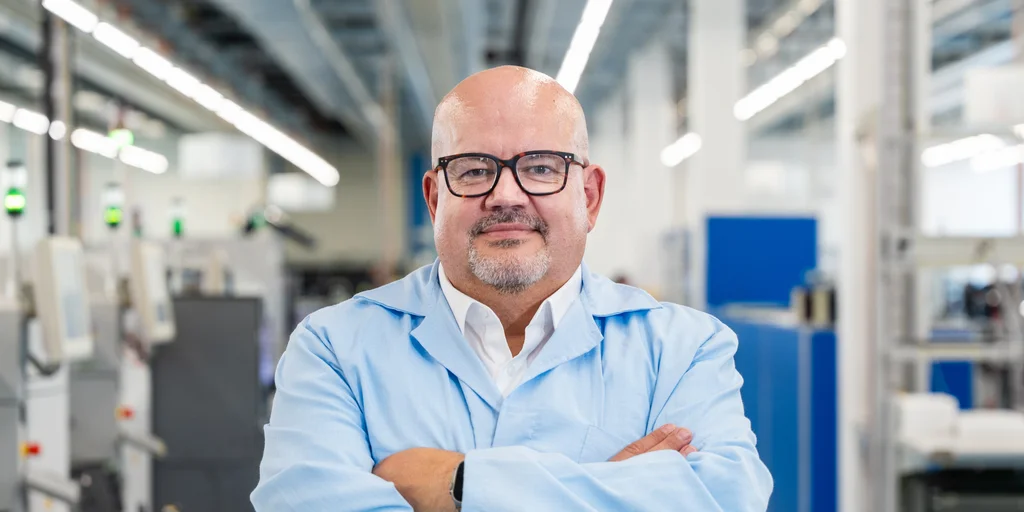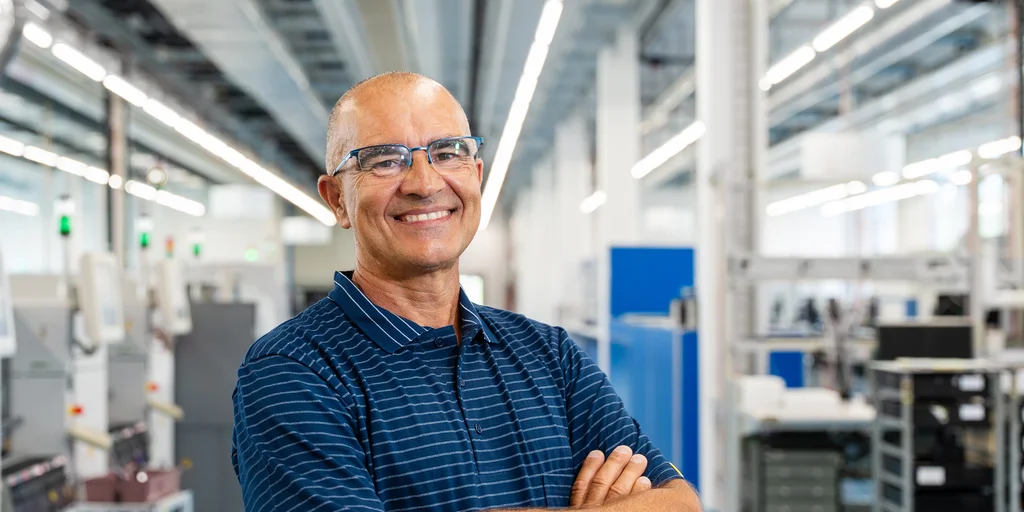Dan Negrea
Smart Wearables: From Idea to Production
"Customers come to us with ideas – we help them turn those ideas into qualified, manufacturable devices."


Dan Negrea is Sales Director at Cicor MedTec Bucharest, a site focused exclusively on medical technology within Cicor’s global engineering network. He shares his perspective on market trends, customer expectations, and what makes Cicor a trusted partner in this space.
Watch Interview Read Interview More Medical Engineering Expertise Contact
Functional cookies are required. Click here if you have trouble watching the video.
Smart Wearables – Dan Negrea’s Full Interview
Dan, what excites you most about working in the field of smart wearables?
It’s the variety of challenges and new ideas that come up every day. Wearables are not only technically interesting, they also push us to think across disciplines. You need to understand electronics, mechanics, testing, usability, and regulatory requirements. There’s constant evolution in this space, and that’s what keeps me engaged. No two projects are the same, and I enjoy that.
Why are smart wearables becoming more important in medical technology?
Because the healthcare system needs them. Hospitals are under cost pressure, there’s a shortage of medical staff, and patients increasingly expect to be treated or monitored at home. That’s where wearables come in. Telemedicine, remote diagnostics, and preventive care all rely on collecting reliable data in real time. AI is part of that picture too, but only if the data quality is good enough. And for that, wearables need to perform at a very high level.
With that demand in mind, what kind of wearables do Cicor teams help develop?
We focus on medical-grade devices, especially those that monitor vital signs. These include temperature, SpO2, blood pressure, heart rate, and respiratory rate, and also more complex signals like EEG and ECG. These are not simple gadgets. They need to be small, wearable, and compliant with medical standards, which makes development and manufacturing much more demanding.
"The key to wearables is system competence."
What are the main challenges MedTech companies face in this area?
It’s easy to come up with an idea, but much harder to bring it to life. There are already too many similar devices on the market, and we see that “Me Too” products are no longer enough. Customers who succeed are the ones who bring real innovation, especially in sensor technology and system integration.
Another big challenge is power management and data transmission, which are still bottlenecks. Also, many companies underestimate the cost and scope of the documentation process, which in medical projects can represent up to a third of the total effort. These are realities you have to prepare for from the beginning.
How does Cicor help customers deal with these challenges?
We support them with a combination of experience, flexibility, and technical depth. Cicor has been active in wearable development for many years. We know where the risks are, and how to avoid them. That applies to both development and manufacturing.
What also helps is that we work very well across teams and across borders. We often collaborate with colleagues in other countries, even if we’ve never met in person. That kind of interdisciplinary, cross-site teamwork is part of our culture, and customers benefit from it.
What makes Cicor different from other companies in this space?
We take a holistic approach. Customers don’t come to us just for a PCB or a specific feature. They come because we understand the system. That includes electronics, mechanics, optics, assembly, and testing, all working together.
Also, we are both a development and manufacturing partner. That reduces handovers, improves alignment, and saves a lot of time. In some cases, it’s the reason why we win the project in the first place.

"Cicor’s value lies in connecting design with manufacturing early. Without that, too many projects stall before reaching production."
One example that captures this approach well is an EEG system we supported. Can you share more about that project?
We supported a customer developing an EEG system embedded in earbuds, designed for continuous sleep monitoring. Space was tight, signal quality had to be precise, and we integrated other sensors like IMU and magnetic field measurement. With fast design loops and smooth site collaboration, we delivered a reliable solution, and the customer immediately confirmed follow-up projects.
What do customers often underestimate when starting wearable projects?
Definitely the documentation and regulatory part. In medical device development, it’s not just about the physical product. The entire process has to be documented, reviewed, and validated. This takes time and experience, and it’s often underestimated, especially by companies entering the field for the first time.
Looking to the future, wearable development isn’t slowing down, but evolving. What do you see coming next in smart wearables?
More powerful sensors, better energy efficiency, and more intelligence at the edge. There’s also growing interest in technologies like embedded components and printed electronics, which Cicor offers as well. We are at the forefront of these innovations and prepared when our customers want to adopt them.
Is there something you can't do your job without?
All the tools are there – including a coffee grinder – but what really matters is the team. Having people you can rely on, who step in when needed and collaborate across sites and time zones, that’s what makes the job not just doable, but rewarding.
About Dan
Dan Negrea is Sales Director at Cicor Medtec Bucharest, a site focused exclusively on medical technology within Cicor’s global engineering network. With a background in electrical engineering and decades of experience in international business, Dan has helped shape Cicor’s role in the development of wearable medical devices.

More Medical Engineering Expertise
Edge AI: Speed and Security in MedTech
Elias Kettunen explains how on-device AI enables real-time data processing, patient privacy, and reliable diagnostics.

System Engineering: Compliance Built In
Andreea Matei shows how live documentation and structured processes ensure faster approval and smoother market access.

Miniaturisation: Smaller Devices, Big Impact
Karl-Heinz Fritz demonstrates how advanced PCB technologies enable compact, multifunctional medical devices.

Qualification & EMC: Ready for Market Launch
Olivier Roy explains how early risk analysis and accredited testing help medical devices reliably pass the first time.

Medical Engineering at Cicor
Our experts share how Cicor accelerates MedTech innovation – from system engineering and qualification to miniaturisation, Edge AI, and smart wearables. Explore the full campaign to see how we help customers turn ideas into manufacturable, compliant solutions.
Let’s talk about your next MedTech project
Whether you’re developing a new device or scaling up for production, Cicor’s experts are here to support you every step of the way. With our integrated engineering and manufacturing capabilities, we help you bring innovative products to market faster and with fewer risks. Get in touch with us today to start the conversation. We’ll get back to you within 3 business days.